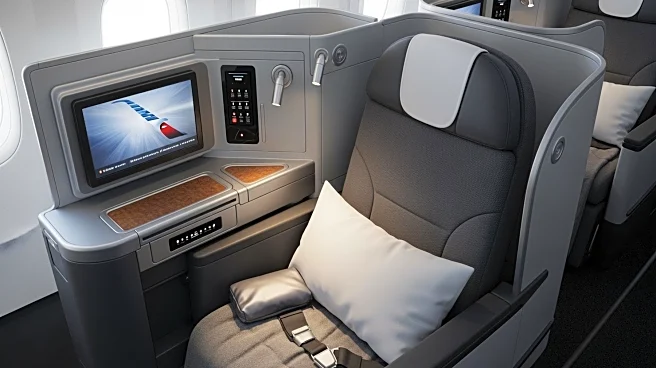What's Happening?
American Airlines is facing challenges in the luxury travel sector, lagging behind competitors Delta Air Lines and United Airlines. Despite efforts to enhance its premium offerings, such as introducing Champagne Bollinger in top-tier lounges, American has
only generated $12 million in profit in the first nine months of 2025, compared to Delta's $3.8 billion and United's $2.3 billion. The airline has also ranked last in customer satisfaction according to J.D. Power's North American airline ranking. CEO Robert Isom is tasked with rallying the company's 130,000 employees to improve customer experience and financial performance. American's stock has declined by 20% this year, although a recent profit forecast exceeded expectations, leading to a 16% rise in shares.
Why It's Important?
The struggle of American Airlines to keep pace with its rivals in the luxury travel market highlights significant challenges in the airline industry, particularly in adapting to post-pandemic consumer preferences. The airline's underperformance could impact its market share and profitability, affecting stakeholders including employees, investors, and customers. The company's efforts to revamp its customer experience and premium offerings are crucial for regaining competitiveness. The broader implications for the U.S. airline industry include the need for innovation and customer-centric strategies to capture the growing demand for luxury travel.
What's Next?
American Airlines plans to continue its investment in premium services, including refurbishing its aircraft and enhancing its digital platforms. The company aims to reduce its debt by $2 billion by 2028 and improve its customer satisfaction ratings. The airline's management will need to focus on executing these strategies effectively to regain customer trust and improve financial performance. The outcome of these efforts will be closely watched by industry analysts and investors, as it could signal a potential turnaround for the airline.
Beyond the Headlines
American Airlines' challenges underscore the importance of customer experience in the airline industry. The company's past decisions, such as removing seat-back screens, reflect a need to balance cost-saving measures with customer expectations. The evolving landscape of luxury travel demands that airlines not only offer premium services but also innovate in technology and customer engagement. The airline's future success will depend on its ability to adapt to these changes and differentiate itself in a competitive market.















